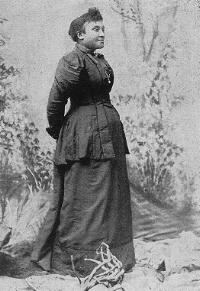

Mrs. Thompson, who before her marriage, was Miss Washington, is a native of Franklin County, Va., where she was born September 16, 1868. Her father, George Washington, was a farmer and a miner. Her mother's maiden name was Serena Guerrant, daughter of Micajah and Judith Guerrant.
Our subject was reared in Montgomery County, Va., and there laid the foundation of her education in the public schools. After that she went to the Christiansburg Normal Institute and later took a four year course at Wayland Seminary, Washington, D. C.
She began her career as a teacher in the public schools of Christiansburg, where she taught two years. She then taught in Augusta County four years.
On June 15, 1892, she was married to Mr. James H. Thompson, of Georgetown, Ill. One child, Edith A. Thompson, (now Mrs. Cardwell) was born to this union. Mr. Thompson is deceased. From 1900 to 1901, Mrs. Thompson was matron of the Colored Orphans' Home at Huntington and while there edited a paper in the interest of the work, known as the Orphan's Friend. Later this work was taken over by the State. On the establishment of the West Virginia Industrial School Seminary and College at Hill Top by the Negro Baptists of the State, she went with that institution and has been on its faculty since. Not only through her work as a teacher but by her contact with the Baptist people over the State she has done much to make the school a success. Mrs. Thompson come into the work of the Baptist church early and has been active all her life. In 1898, she was made President of the Woman's Baptist State Convention, which position she has held without a break for 24 years. In the early history of the organization she had to do much of the missionary work of the Woman's Convention on account of the lack of trained leaders. The work has taken her into every part of the State and there is not a colored woman in West Virginia who is better known than Mrs. Thompson. Under her administration the organization has grown from a membership of less than one hundred to more than fifteen hundred. There has been an even greater growth in finances. Mrs. Thompson is identified with the Woman's Improvement League.
Speaking of her early struggles for an education she says, "My parents were very poor, could hardly send me to the free schools. I was a very apt pupil in the country school and a man by the name of Captain C. S. Schaeffer, of the Freedman's Bureau, visited our school one day and "heard" our lessons. At that time I remembered everything I learned. I could spell every word, foreign and otherwise, in the spelling book. I could repeat every poem from memory that I had read. This gentleman told my father that there was nothing else in the public school for me to learn. The public school course at that time was not as full, nor advanced as at present. After some persuasion I went to Christiansburg, Va., and entered its Normal Institute for colored boys and girls. This school was founded and maintained by the Friends or Quakers of Philadelphia with a little help from the county. Before I finished the course there, through the influence of a friend I was sent to Wayland Seminary, Washington, D. C., where Mrs. Mary Luther, of Watchmocket, paid my tuition for three years. I worked during the six years in school, not having presentable clothing at all times. In 1880 I graduated with honor."